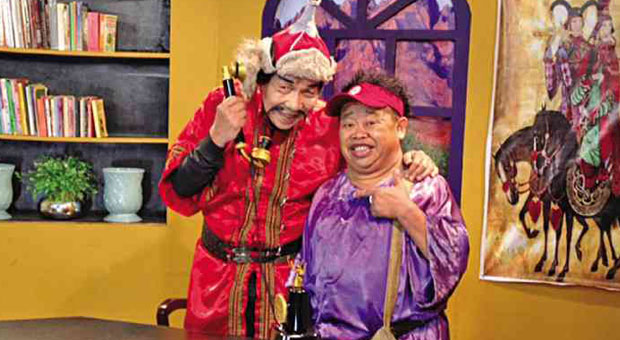“Mr. Shooli and I are different. He gets away with murder,” actor-director Jun Urbano told the Inquirer of his alter ego in “Mongolian Barbecue,” which began airing on the cable channel GNN in May.
Urbano, whose character rose to fame in the late 1980s, added, “I don’t attack people when I’m not in costume. I censor myself. As Mr. Shooli—well, he’s a cartoon character, so that’s another story. If you allow him to get to you, you lose.”
The TV satire, which is now seen Fridays at 9 p.m., was revived, Urbano said, “because GNN bosses who grew up knowing him, missed him.”
Urbano had one condition to get back on the saddle: total creative control. “I also asked that the writer (Noel Balmaceda) who started ‘Mongolian’ with me, also work on the new show,” said Urbano. And of course he brought along “Kuhol,” Mr. Shooli’s equally popular sidekick.
Since its resumption, “Mongolian Barbecue” has featured Leonor Briones, former National Treasurer and now University of the Philippines professor emeritus; Alex Lacson, lawyer and former chair of Kabayanihan Foundation; Eugenio Villareal, lawyer and chair of the Movie and Television Review and Classification Board; and Lysander Suerte, brigadier-general and deputy chief of staff for civil-military operations.
“It’s still basically a talk show,” said Urbano. “All of our guests so far have been game.
Who are your major influences as an artist?
My father (National Artist for Film) Manuel Conde started making movies after the war. His first was “Si Juan Tamad,” with (National Artist for Visual Arts) Carlos “Botong” Francisco as production designer. As they worked, they talked about Philippine history. Thus, I learned about Prinsesa Urduja, Limahong and Sarangani.
While most Filipino films at that time told stories of rich city boys in love with barrio lasses, my dad made movies about the German literary hero Siegfried or the Mongolian conqueror Genghis Khan. I guess he just wanted to put Francisco’s talent as production designer to good use. They were my influences. Their love for country and history inspired me. My father’s movies were almost always about Filipino culture. “Ikaw Kasi” (1956) was about the coconut industry. “Bahala Na” (1957) told of the mining industry in Daet, Camarines Norte. “Tingnan Natin” (1958) featured thebakya factories in Paete, Laguna.
How was Mr. Shooli “born”?
After so many odd jobs, I became a top director of TV commercials. I must have done almost 2,000; many are now considered classics. I was already 50 when I joined show biz as a performer. I wondered, “What have I done for myself?” I wasn’t a Soriano or a Cojuangco but I was fine. But I saw that the country wasn’t the same as when I was in high school. I decided to “talk” to the Filipino people—
through comedy.”
Imitating the way Chinese people talk is a skill I developed in school. I thought of using a Chinese character for my act, but I feared that the Chinese-Filipino community would get offended. I checked if there was a Mongolian embassy in the Philippines—there was none! So I decided to be Mr. Mongolian. He didn’t have a name until he got invited to the TV show “Not So Late Night With Edu” (Manzano, 1985).
Edu asked, “Mr. Mongolian, may I have your name?” The character didn’t have a name but I said, “Surely! Surely!” Edu thought I said “Shooli” and that became his name.
What are the qualities of a good comedian?
He is very observant. Ideas are not whipped up from thin air. He should write his own scripts. This was my training as a Journalism graduate—to write, put ideas on paper. I read the news. They triggered even more ideas.
What do you think of current comedians?
Most of them are gay, and from comedy bars. They make the audience laugh by insulting people. Vice Ganda didn’t have to insult (broadcaster) Jessica Soho because he was already a celebrity.
For me, comedy is a means to deliver a message. To be honest, I’m a better director than comedian. Unlike Willie Nepomuceno, I don’t have many different characters. He’s better than I am. He’s one of the few that I admire.
I like Michael V’s brand of comedy, too. He is decent. I watch his show “Pepito Manaloto” because it’s good, clean fun. He doesn’t offend people. He reminds me of the comedians of my youth—Pugo and Togo, Eddie San Jose… Jokes these days border on brutal.
Mae Paner is a good friend. I’ve told her that I don’t like her character Juana Change—maasim kasi siya, always angry. I told her that Pinoys don’t mind being kicked on the backside, basta nakatawa sila.
(E-mail mcruz@inquirer.com.ph.)


